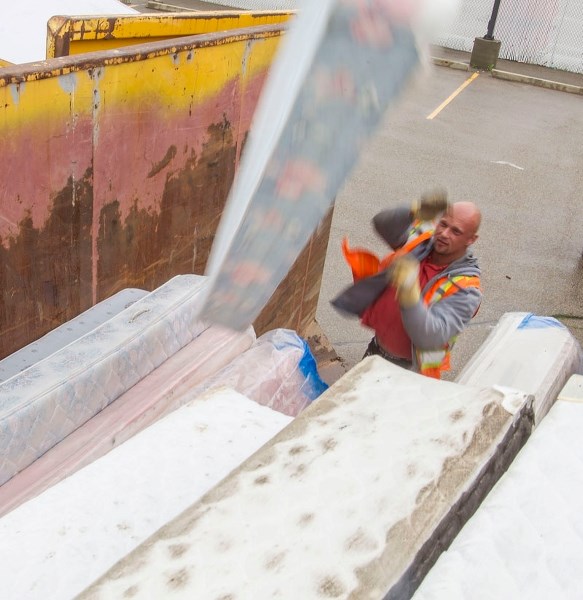Got a giant stuffed moose that just won’t fit in your trash? For the first time ever, you’ll be able to kick it to the curb for pickup next month.
St. Albert is holding its first annual curbside large item pickup event this Sept. 12 to 16.
The event is an extension of the large item drop-off events the city holds twice a year at the public works yard, said city environmental manager Christian Benson. While those events often draw hundreds of participants, they’ve also sparked complaints from residents who don’t have a car to haul their oversized junk to the drop-off point.
City council budgeted $50,000 to run a curbside large item pilot event this year, Benson said. Spruce Grove and Strathcona County hold similar events.
Under this pilot, residents will get to put out up to two oversized items plus two additional oversized electronic items along with their regular waste on garbage day for garbage collection. Crews will come along on garbage day to pick up the items and haul them to the dump.
All items must be smaller than 1.8 m by 0.9 m and weigh less than 90 kg to be accepted for pickup, Benson said, as crews have to be able to lift them by hand. Any mechanical devices should be drained of all fluids, and any large items compressed or compacted as much as possible.
You won’t need a waste tag, but if you are tossing out any item that you’d commonly find in a front yard (such as a bike or lawn mower), you’ll have to put a note on it to indicate that you want it taken away.
Benson said couches, stoves, rain barrels, desks, sinks, TVs and mattresses were all acceptable items for pickup. Those items not accepted for pickup are tires, cars, assembled swing-sets and anything containing coolant or Freon. Cars should be sold for parts or scrap, while fridges should be sent to a regional Eco-Station.
“This really is just for junk items,” Benson added. If residents have an item that’s still in good shape, they should donate it.
If you have more than two big items to ditch, you can always save them for the regular large item drop-off on Sept. 24.
Benson expected to collect about 350 tonnes of waste through this event – about 10 times what the city collects at its large item drop-off events – based on similar curbside collections in the Edmonton region.
Questions should go to [email protected].
Up to 100 permaculture fans will come to Sturgeon County next month for a conference on how to make a sustainable community.
Kurtis Ewanchuk and the Aspen Centre for Integral Living are gearing up to host the 2016 Northern Alberta Permaculture Convergence next month at their permaculture demonstration site 30 km west of St. Albert.
It’s the first time the group has hosted this event, which is aimed at anyone with an interest or expertise in permaculture techniques.
“Permaculture is a design system for sustainable human living,” said Ewanchuk, co-founder of the Aspen Centre.
In addition to composting, planting food forests and using renewable power, permaculture also involves social techniques, such as getting to know your neighbours so you can share skills.
“It’s taking responsibility for your own needs and the needs of your community.”
The conference is called a “convergence” as it’s like a conference, but with lots of hands-on activities, Ewanchuk said. Delegates will get to plant trees, dig swales, make cheese and build emergency shelters as part of the conference. There will also be dinners, concerts, yoga lessons, talent shows and other activities.
Ewanchuk said permaculture techniques are catching on as climate change drives our need to build resilience into our industrial economy. Builders are now incorporating passive solar and renewable energy into their homes, for example, while Edmonton residents are planting trees through the Roots for Trees program, which was founded in part by permaculture advocates.
“More than ever before, people and different businesses are taking responsibility for their (own) needs.”
The event runs from Sept. 15 to 19. Tickets are $125, and there are just 100 spots available. Visit aspencentre.org/napc for details.




